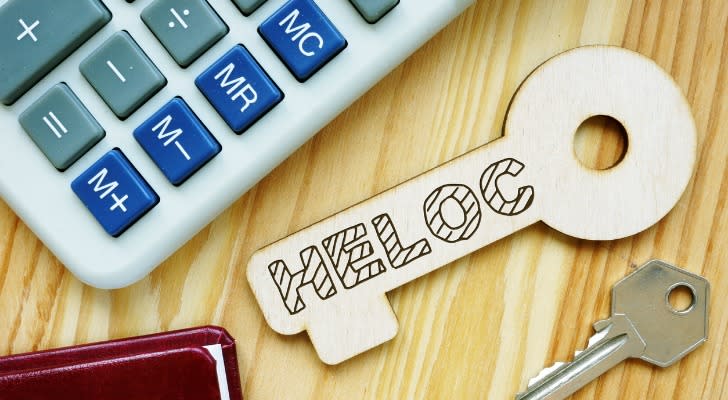Do I Want a 401(k) Loan or a HELOC?

A 401(k) loan empowers you to tap into your retirement savings, while a HELOC permits homeowners to borrow against the equity of their homes. Both loans have their own set of qualifications, interest rates and repayment plans, making them suitable for different financial scenarios, depending on an individual’s specific requirements and circumstances. You may want to consider working with a financial advisor to not only put your finances in a better position but to see what might be the best option for you.
What Is a 401(k) Loan?
A 401(k) loan is a type of loan enabling individuals to borrow against the balance of their 401(k) retirement account. While the prospect of borrowing from your future self might seem tempting, it is pivotal to consider several core aspects. But note, procuring a 401(k) loan may not be the optimal choice for everyone and discussing this option with a financial advisor is advised.
When you opt for a 401(k) loan, you essentially borrow money from your retirement savings. Consequently, you need to repay it over a designated period, generally five years, through payroll deductions. Although the interest on the loan gets recouped to your account, taking a 401(k) loan is a serious financial decision with significant implications.
Pros and Cons of a 401(k) Loan
A 401(k) loan can carry multiple benefits, such as:
Immediate access to funds
No mandated credit checks
The interest paid goes back to the borrower’s account.
However, it's crucial to consider this borrowing’s associated risks to prevent disruptions to retirement savings growth, which include:
Borrowing from a 401(k) can possibly interrupt your retirement savings growth
Hefty penalties may apply if the loan isn’t repaid within the stipulated period
Discussing these aspects with a financial advisor can ensure you understand your personal financial risks and future ramifications and help you make the right choice for you.
What Is a HELOC?
A Home Equity Line of Credit, or HELOC, is a borrowing method allowing homeowners to utilize their homes’ equity. It’s an excellent tool for those intending to finance significant expenses such as home improvements, education or even debt consolidation. Just like a credit card, a HELOC extends a revolving line of credit, enabling homeowners to borrow and repay according to their financial situation.
Pros and Cons of a HELOC
HELOCs offer several perks, which include:
Flexible access to funds
Potential tax benefits
Typically have lower interest rates than other forms of credit
However, it comes with associated risks, such as:
Risking your home
Potential variable interest rates
Possible upfront costs
These risks need careful consideration to avoid adverse financial impact and are critical in decision-making.
Comparing 401(k) Loans vs. HELOCs

401(k) loans and HELOCs cater to different needs and circumstances. While 401(k) loans may offer quicker access to funds depending on individual circumstances, without impacting your credit score, HELOCs might extend potentially larger loans at lower interest rates, albeit risking your home. Here is how each compares to the most important loan details.
Loan Limits: 401(k) loans and HELOCs both have limitations to consider when making a choice. The IRS limit is 50% of your balance up to a $50,000 cap. A HELOC might offer up to 85% of a home’s equity.
Repayment Terms: 401(k) loans need repayment within five years, while HELOCs stipulate a draw period (usually 5-10 years) and a repayment duration (typically 10-20 years).
Interest Rates: From an interest rates perspective, 401(k) loans often yield lower interest rates than credit cards and personal loans, while HELOCs carry variable interest rates that may be lower than fixed-rate loans.
Type of Payout: A 401(k) loan usually renders a lump sum, whereas a HELOC offers a drawn-out line of credit. Discussing these differences with a financial advisor is recommended to ensure you fully understand the implications and benefits of each loan type.
When to Consider a 401(k) Loan or a HELOC
A 401(k) loan might suit individuals needing quick access to funds and those confident in their job stability. In contrast, a HELOC might fit homeowners aiming for ongoing access to funds, able to pay variable interest rates and comfortable using their home as collateral. Neither choice is definitively superior and what's pivotal is choosing what’s congruous with individual financial circumstances.
Other Alternatives to a 401(k) Loan
While 401(k) loans and HELOCs form substantial borrowing options, there are alternatives like personal loans, credit cards and refinancing with a cash-out option. These substitutes also come with different interest rates, repayment terms and loan limitations and might be more or less suitable depending on personal financial circumstances. No option can be universally superior, therefore, consulting a financial advisor might provide expert insight into these alternatives. Each loan option comes with its own unique risks.
Bottom Line

Understanding the differences between a 401(k) loan and a HELOC, as well as their respective advantages and drawbacks, can bolster making informed decisions while borrowing. Evaluating all options, and seeking professional financial advice, encourages well-informed decision-leading, essential to best align with your personal financial circumstances.
Tips for Financial Planning
Managing your full financial picture can be difficult if you don't have the right expertise. A financial advisor can help you create a long-term plan and help you make decisions that impact your financial future. Finding a financial advisor doesn't have to be hard. SmartAsset's free tool matches you with up to three vetted financial advisors who serve your area, and you can have a free introductory call with your advisor matches to decide which one you feel is right for you. If you're ready to find an advisor who can help you achieve your financial goals, get started now.
Wondering what financial impact a loan might have on you? Take a look at our free personal loan calculator to estimate payments and the total cost of borrowing money.
Photo credit: ©iStock.com/Delmaine Donson, ©iStock.com/fizkes, ©iStock.com/Andrii Dodonov
The post 401(k) Loan vs. HELOC appeared first on SmartReads by SmartAsset.
